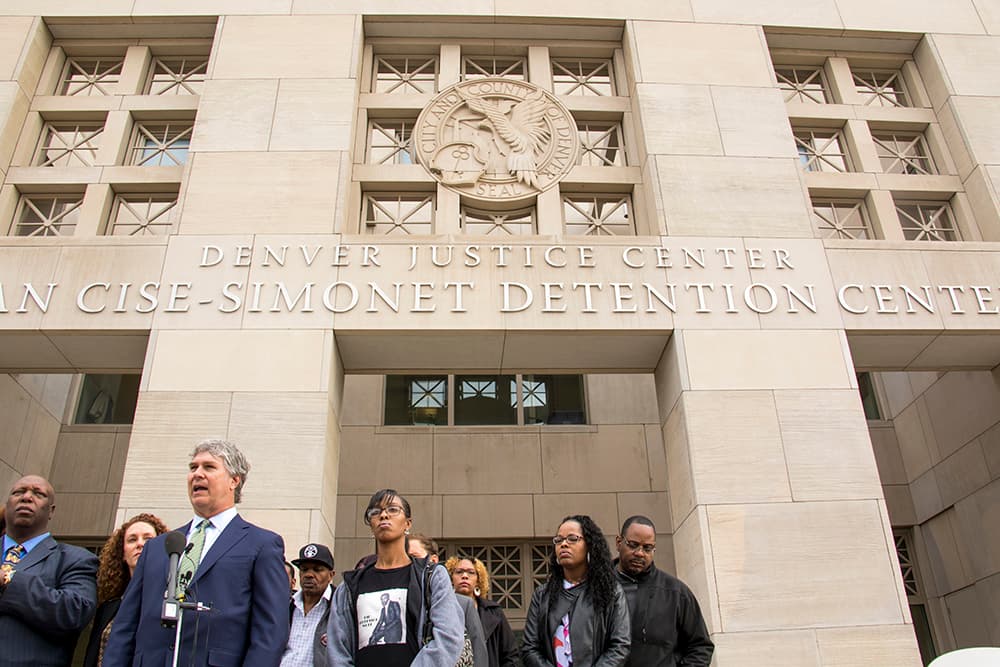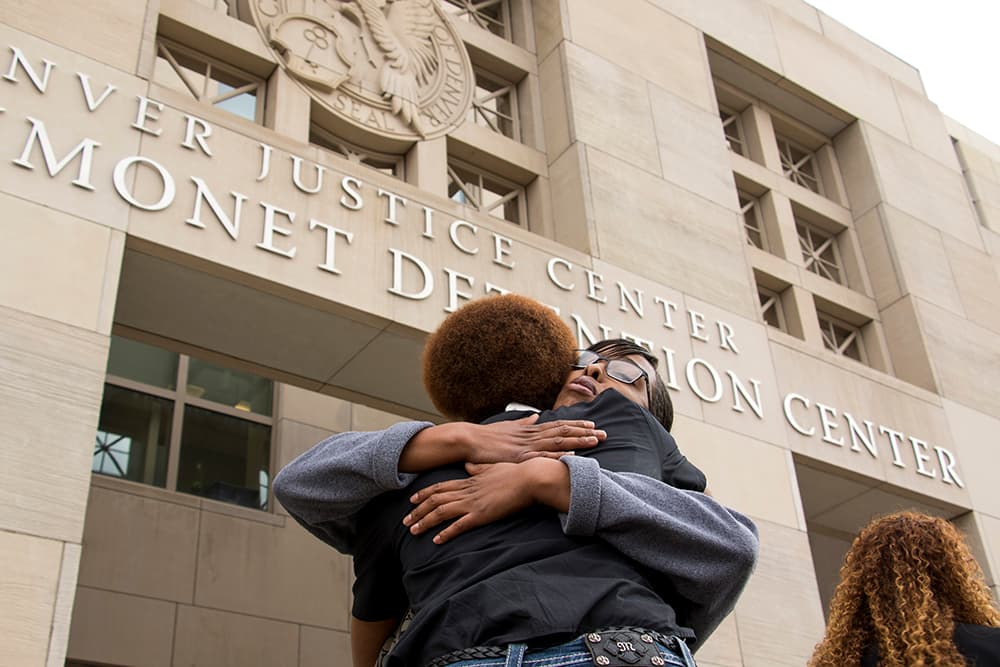
The city of Denver has reached a settlement with the family of a mentally ill man who died after being restrained by deputies in county jail. The city will pay $4.65 million to the family of Michael Marshall and change policies and procedures in the jail in hopes of improving how guards deal with people with mental illness.
Darold Killmer, an attorney for the family, announced the terms of the settlement Wednesday morning, and they were confirmed by Denver City Attorney Kristin Bronson at a press conference. The Denver City Council still needs to vote on the settlement, most likely at its Nov. 13 meeting.

At his own press conference with the Marshall family, Killmer said money will not bring closure to those who knew and loved him, but it does send a strong a message to the city. With the Marshall settlement, Denver has paid more than $19 million in three years to people who suffered violence at the hands of police officers and sheriff's deputies.
"A financial component to a settlement is crucial because you have to speak the language of the institution that you're talking to, and I don't believe that cities such as Denver or others care that deeply for the well-being of the person who's been killed or for that matter their family," Killmer said. "And unless this costs them more money, they won't pay attention.
"The size of a settlement like this is important, because it tells the community who was right and who was wrong in this, and it also tells the city of Denver that this isn't good business. You might try to save some money by not staffing a jail with a social worker, for example, but how much money does it really save if people keep dying and you have to keep paying millions and millions of dollars in settlements?"
Killmer noted that the circumstances of Marshall's death had a lot in common with that of Marvin Booker. In that case, the city ended up paying $6 million to Booker's family in 2014, a year before Marshall was killed. Denver District Attorney Beth McCann has recently launched an investigation into the handling of evidence in that case at the urging of Booker's family, who are also represented by Killmer.
Bronson said the City Attorney's Office agreed to the settlement after careful investigation of the facts of the case and considering the cost of going to trial and the possibility of losing at trial.
Marshall, 50, died in 2015 after he was restrained by several deputies in a prone position for several minutes. He choked on his own vomit and suffocated. Experts say the common but risky tactic can be lethal, especially on those with medical problems and the mentally ill, whose distress is sometimes confused with resistance. An autopsy said the use of force contributed to Marshall’s asphyxiation, though he also suffered a heart attack and had underlying heart problems. His death was ruled a homicide.
Marshall had been arrested on suspicion of trespassing and remained in jail for lack of $100 to bond out. He stood 5-feet, 7-inches tall and weighed 112 pounds.

Natalia Marshall remembered her uncle as a gentle man.
"He didn't commit any crime. My uncle was not a criminal, and I need that to be known," she said. "... He used to pick me up from school. He used to speak to the fence and the trees on the way home. He'd say, 'adios amigos.'"
Three sheriff's deputies were disciplined in the case, earning suspensions without pay between 10 and 16 days. Members of Denver's Citizens Oversight Board later said they were "extremely troubled" by the short suspensions. A Denverite examination of discipline records found that deputies who repeatedly left work early, mishandled firearms and parked in restricted areas earned harsher punishments than the deputies whose actions contributed to Marshall's death.
Bronson called the death a tragedy that has had far-reaching consequences not only for Marshall's family but for the sheriff's department and the broader community. She said the city is committed to improving how deputies deal with people with mental illness in custody but also to improving diversion rates so that people in crisis get treatment instead of being incarcerated for minor violations.
City officials declined to discuss the details of what happened to Marshall at the hands of deputies because the people involved are appealing their discipline. Despite the settlement with the family, it's still an open case in that sense.
However, Sheriff Patrick Firman said new training aims to teach deputies to de-escalate situations when possible and to consider whether an intervention has to happen immediately or whether they can take time to come up with a plan and proceed more carefully.
Firman estimates that 25 percent of inmates at the jail have serious mental illnesses and an even larger number have less significant manifestations of mental health problems.
The Denver Sheriff's Department adopted new use-of-force policies last year after a lengthy community process -- policies that many deputies say have made their job more difficult and the jail less safe for deputies and inmates. Firman and Bronson said that reform process is ongoing and further development of mental health protocols is part of that.
In addition to the monetary settlement, Denver has agreed to:
- Fund and hire two new full-time mental health providers -- nurses or licensed clinical social workers -- for the Downtown Detention Center and the Denver County Jail;
- Require an annual training for all deputies on dealing with mental health issues in jail;
- Require an annual training for all deputies on mental illness and use of force;
- Develop a protocol for better communication between medical staff and jail guards about inmates with mental health issues;
- Develop a streamlined protocol to allow family members to visit jail inmates who have been seriously injured;
- Strengthen policies that require jail staff to communicate with medical providers when they encounter potential mental health issues with inmates;
- Include information about training in the sheriff's department's annual report for the next five years.
This story has been updated with comments from attorney Darold Killmer and Michael Marshall's niece, Natalia Marshall.
Andrew Kenney contributed reporting to this story.










